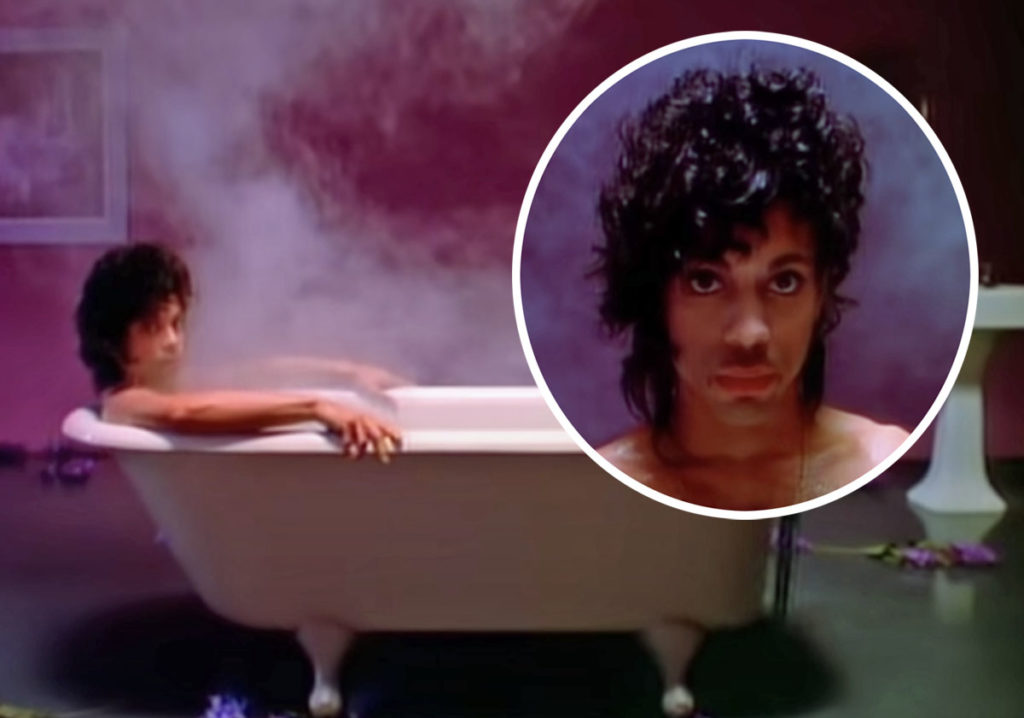Prince’s inner circle is opening up about what they believe really led to his death. Obviously we all know the music legend died from an accidental overdose of the synthetic opioid fentanyl back in 2016 — but the initial reason is sure to surprise you.
The new story comes from insiders speaking out in a new book by Touré titled Nothing Compares 2 U: An Oral History of Prince.
According to early excerpts from friends and bandmates, the Purple One was supposed to perform from inside a bathtub — à la the When Doves Cry music video (above) for his Purple Rain tour. Only the tub was suspended 10 feet off the ground. During a rehearsal of the spectacular stunt, things went terribly wrong, his tour manager Alan Leeds recalls:
“[The bathtub] fell 10 or 12 feet with him in it. I never moved so fast in my life.”
So scary!
Thankfully, the musician didn’t suffer any life-shattering injuries in that accident — but the pains he sustained would go on to haunt him for what turned out to be a lifetime.
Related: Britney Spears Posts Dance Of Celebration After Jamie STEPS DOWN From Conservatorship!
Leeds details:
“After that, his back hurt day after day. Then in LA, he slipped and hurt his knee. He got some meds and finished the tour, but I don’t think his hip and his leg were ever completely normal after that.”
These minor injuries, which resulted in chronic pain, are what many believe to be the catalyst for Prince’s eventual addiction to pain pills — the one that killed him.
The great, sad irony is that this came after years of being strictly anti-drug. While rising to fame, the 1999 singer had a harsh reputation for being a goody-two-shoes, or as his cousin Pepé Willie puts it:
“He wasn’t hip at all. Prince was a square.”
Ha! Well, we wouldn’t put it that way. But he did hate drugs.
Even as a young adult, the legendary singer hated when those around him indulged in drugs themselves, the “Godfather of the Minneapolis Sound” remembers:
“We’d go outside, smoke a doobie and come back upstairs, and he goes, ‘Oohhhh, ooohhh, look at you! Your eyes are red! Look at you, look at you!’ And we’d be going like, ‘Oh, man, come on.’ He was square.”
Given another friend’s memory, it sounds like the rockstar had a pretty good reason to be so wary of drugs — he’d had a terrible trip once! Morris Day, lead singer of The Time and co-star of the film Purple Rain, tells the story in the book:
“I got some mushrooms and we both tried them. We went to a club and this dude starts freaking out. Next thing I know, he’s sitting on the floor with his head in his hands, and he was tripping like his mind was playing games on him. He was like, ‘I’m not never doing this s**t with you no more.’”
LOLz! Love that he knew his limits!
He also knew exactly what he needed to spend all-nighters making music in the studio. Rather than get high, Prince preferred a sugar high! According to one-time fiancée and vocalist in many of his bands, Susannah Melvoin, the performer loved nothing more than some dessert:
“In his marathon sessions, he would eat cake. He loved, loved, loved cake, mostly vanilla with chocolate frosting.”
HAH! So cute! Susannah added:
“I would make that for him on a regular basis and that would keep him going. He would come up from the studio, take another slice, go back down. That’s how he kept going.”
The music icon, born Prince Rogers Nelson, disliked drugs so much that he supposedly dumped his girlfriend Vanity because she liked to get high! Basically, anyone in his circle had to stay sober or get out, says Leeds:
“If he saw two crew guys in a corner looking suspicious, he’d have me check on it. He had a borderline paranoia about having anybody around who was into drugs.”
As you’re probably gathering by now, the dude was f**king intense when it came to narcotics — which is what makes his death even more tragic. Thinking back on his final years, the Minneapolis-born artist was said to have started taking ecstasy and hallucinogens recreationally around the epic failure of his 1988 album Lovesexy, according to his former girlfriend and background vocalist, Jill Jones, who shares:
“He started doing hallucinogens with [his then-girlfriend] Ingrid Chavez and all these different people and looking back now, for me, that’s a red flag.”
The book’s author then alleged a large reason for Lovesexy’s failure was because Prince made a last-minute decision to release the record over the more “lewd and aggressive record” titled The Black Album, which he had a “bad feeling” about while under the influence. (It would later be released in 1994). With decisions beginning to be affected by his drug addiction and a dislike for doctors, the writer believes the guitarist might have been self-medicating “as early as the early ’90s.” Keyboardist Morris Hayes thinks the same thing — even alleging Prince went to rehab once in 1994.
Once noticing the Under the Cherry Moon actor dabble with drugs, the piano player confronted him, saying:
“Hey man, I don’t mean to cause no problems, [but] you’ve really been weird and acting really out of character lately. Word on the street is you’re messing with drugs.”
Morris says his boss responded:
“Aw, man. I’m not doing anything like that. I’m working, I’m doing stuff. It’s nothing like that. It’s cool.”
Then the musician disappeared for a week, after failing to show up for rehearsal. Nobody heard for him the entire time — and when he returned he shocked them all by announcing he’d gone the entire seven days without playing the guitar or writing a song. Prince reportedly told his bandmate:
“I took some time to lie about and kind of cool out and I appreciate you coming in here and saying something.”
That interaction had Hayes even more concerned. He reflects:
“That he didn’t play or write for a whole week was really a big deal. I’ve never seen Prince go a day without doing something musical, much less a week. I was like, ‘Well, what did he do?’ We didn’t hear from him; no one in the band did. I don’t know what else he could’ve did other than go somewhere where he was sequestered. I think he went to rehab. I hope he went to rehab. I think he was dealing with an issue and I hope that’s what he did.”
Whether or not he did go to rehab has never been proven. Unfortunately, things didn’t change for long after that break, whether he sought professional help or not.
Related: Related: Jonah Hill Explains Why He Needed To ‘Hit Pause’ On Hollywood For A Few Years
Things only intensified as his final days unknowingly approached, with a heavy reliance on opiates. Wendy Melvin, Susannah’s twin sister, notes:
“I think the thing that controlled him was his drug addiction.”
Agreeing with others, she thinks the drug addiction began as a failed attempt to keep his “aches and pains” at bay:
“His use of pain pills was probably longer than maybe some of us might have thought because, when he started getting his aches and pains, I think he really relied on it. And he was little. I think it just got worse for him over time.”
Mark Brown (who was dubbed Brown Mark), bassist for The Revolution, adds:
“I feel that the whole fentanyl thing was just him escaping pain from the hip and it got out of hand.”
Recalling the early accidents of Prince’s career, Mark furthers:
“[He needed] something to take that pain away, but then it got to the point where the addiction settles in, but he’s keeping it hidden because the thing he lived by [was], ‘Never let anybody see you sweat.’”
Prince died on April 21, 2016 at just 57 years old. According to Wendy, he typically weighed around 145 pounds when healthy, but was just 107 when he passed away. She also remembers there being “thousands of pills all over the building” where he was found dead.
Ultimately, the author determined Prince’s death wasn’t a cause of a rock star gone rogue, but a more harrowing reality of so many in the country, concluding:
“He wasn’t doing drugs like a hedonistic rock star. He was doing drugs like so many working-class Americans who need pills to get breaking-down bodies through the workday so they can show up for the people who rely on them.”
Wow… Such an important takeaway. While Prince may have led one of the most high-profile lives, ultimately, the thing that took his life is the same struggle that hundreds of well-meaning people face.
Thoughts, Perezcious readers? Will you be reading the rest of this book? Let us know in the comments (below). Nothing Compares 2 U: An Oral History of Prince is available at bookstores everywhere now.
If you or someone you know has an addiction, call 1-800-622-4357 for free and confidential treatment referral and information from Substance Abuse and Mental Health Services Administration (SAMHSA).




































